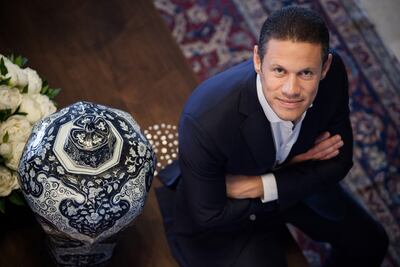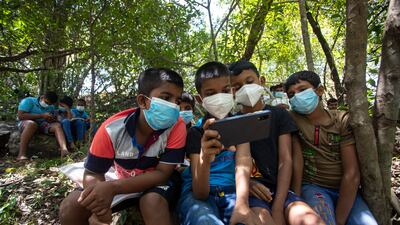A quick and decisive mobilisation of resources and economical internet services are required to bridge the widening digital gap in the post-Covid era, industry experts have said.
With an estimated 47 per cent of the global population offline and the cost of available broadband exceeding the affordability in 50 per cent of developed countries, it is necessary to accelerate efforts to achieve digital inclusion at all levels, Badr Jafar, chief executive of Sharjah-based conglomerate Crescent Enterprises, told a panel at the World Economic Forum’s Edison Alliance discussion on ‘boosting digital inclusion’.
“We, the connected people, are the true agents of change … and history will judge us on whether we really used these tools for the collective betterment of humanity and our planet,” he said.
About 85 per cent of the world’s population lives in areas covered by 4G connectivity but only half are online, with cost the “critical barrier” to connectivity, the WEF said.
In low-income countries, home to 650 million people, mobile broadband is 18 times more expensive than in developed countries, as a proportion of average income, the forum said.
The Edison Alliance aims to improve the lives of 1 billion people by increasing cheaper digital access to health care, finance and education by 2025.
As an Edison Alliance partner, Crescent Enterprises aims to scale up the digital capacity of small and medium enterprises in the Middle East and North Africa region. The SMEs account for more than 90 per cent of all businesses in the Mena region.

The region is spearheading its efforts towards digital inclusion with new investment.
In Saudi Arabia, the Arab world’s biggest economy, information and communications technology spending was expected to exceed $37 billion last year, the Middle East Institute said. Meanwhile, the UAE’s ICT spending is estimated to reach $23bn by 2024.
“Most of the world’s population live within the coverage of broadband infrastructure. However, the lack of … affordable services means that still 47 per cent of people cannot participate and do not benefit from the internet,” said Derek O’Halloran, head of the platform for shaping the future of digital economy and new value creation at WEF.
“The challenge is about more than infrastructure – it is about the collaboration and investment needed across different industries, governments and civil society to bring safe, meaningful services to people’s lives."
The coronavirus pandemic forced countries last year to impose widespread restrictions on movement and prompted remote working. But the outbreak also exposed the steep digital divide between countries as those with poor connectivity lagged behind.
The internet penetration rate is 87 per cent in developed countries but only 47 per cent in developing countries – and 19 per cent in the least developed countries, said the International Telecommunication Union, a UN-backed agency,
“As we emerge from the Covid-19 pandemic, it’s never been clearer that digital accessibility, affordability and usability are critical to participate in everything from education and banking to receiving basic health care,” said Hans Vestberg, chairman and chief executive of the US telecoms company Verizon.
“Through the Edison Alliance, we aim to create a more digitally inclusive world by connecting 1 billion lives to this fundamental core of our society."


